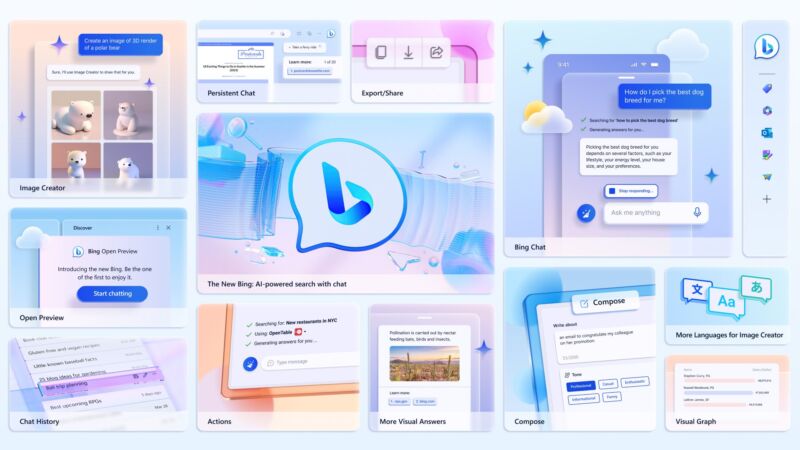
Today, Microsoft continued its push to integrate generative AI features into all of its products, announcing a range of small updates to its ChatGPT-powered Bing chatbot and moving the product from a closed, invite-only preview to an open preview that anyone can join. This next phase of the "new Bing" comes just three months after Microsoft introduced it and further demonstrates Microsoft's commitment to putting AI features in all of its products as quickly as possible.
The "Open Preview" phase of the New Bing makes the chatbot and other features available to anyone with a Microsoft Account, and it coincides with a push to make the chatbot "more visual." Bing Chat will soon be able to generate charts and graphs as part of its answers, and the Bing Image Creator will be available in all of the 100-plus languages supported by Bing. A new visual search feature will let you search for images by uploading a similar image to Bing Chat first.
Microsoft is also planning to expand the amount of history and context Bing Chat can remember, "moving from single-use chat/search sessions to multi-session productivity experiences with chat history and persistent chats within Edge," writes Microsoft VP Yusuf Mehdi. This means you'll be able to return to previous chat sessions, chats can stay open while you browse in Edge, and chats will become "more personalized" as Bing Chat "bring[s] context from a previous chat into new conversations." The latter feature will be rolled out "over time" since it's something Microsoft is still "exploring."
The additional exploration time may be warranted. Previously, Microsoft limited the length of individual chat sessions and introduced different "personalities" to keep the Bing chatbot's responses from being too weird, threatening, nonsensical, or just plain buggy (Microsoft's euphemism for this behavior is "conversational drift"). It's not clear whether extending the length of chat sessions and making Bing Chat aware of the context from previous conversations will reintroduce or exacerbate some of those problems again.
Microsoft wants to make the Bing chatbot into a "platform," and to that end, the company will soon add support for third-party plugins to extend its capabilities. Microsoft mentions OpenTable and Wolfram|Alpha as initial partners for making reservations and extending the chatbot's math and science chops, respectively. More information on how to create plugins for Bing Chat will be announced at Microsoft's Build developer conference in late May.
As it does in most of its AI-related announcements, Microsoft reiterated its "AI principles" and pointed to a recently updated "approach to responsible AI" document (PDF). Microsoft will continue to address "potential harms" as testers encounter them, but the company is still obviously all-in on this new AI-centric strategy for Bing, and it doesn't seem likely that it will slow or suspend its rapid rollout any time soon.
Microsoft has said that every percentage point of search market share that Bing can take from Google is worth roughly $2 billion in yearly advertising revenue. Google's Bing Chat competitor, Bard, is off to a rough start, and there's a widespread feeling that Google search isn't as good at surfacing good results as it used to be; after over a decade of languishing in a distant second place, it's not hard to see why Microsoft is pushing Bing Chat and generative AI features hard despite criticism and skepticism.
In addition to Bing and Edge, Microsoft has introduced generative AI features into Windows 11's taskbar, Skype, and GitHub, among other products. The company also previewed a Copilot feature to help automate document and email creation in Microsoft 365 apps like Word, Excel, PowerPoint, Outlook, and Teams.
Listing image by Microsoft
Reader Comments (101)
View comments on forumLoading comments...